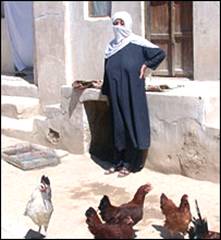|
|
Poverty Haunts Afghan Security Quest
BBC News
Afghanistan
February
23, 2006

As international donors meet in London to discuss efforts to rebuild Afghanistan, the director of the UN World Food Programme in Afghanistan, Charles Vincent, explains why the talks are vital for ordinary Afghans.
Bibi is a 52-year-old widow living in the southern Afghan city of Kandahar and her life story is one of misery and tragedy.
Her first son disappeared during the Russian invasion of Herat in the mid-1980s.
The family fled to Kandahar where her husband and second son were killed during the ensuing civil war.
Ten years later, her surviving son was killed under the Taleban regime.
Bibi, her widowed daughter-in-law and her three granddaughters have struggled over the years.
Widows, whether young or old, face many economic and social problems in Afghanistan, particularly if they have no male relatives to support them.
They are largely seen as a burden and eke out a meagre living begging, washing clothes or carrying bricks on construction sites.
Bibi survived as a carpet weaver but with her deteriorating eyesight, she was unable to continue working.
She has recently found hope with a small-scale poultry farming project.
The all-female family now owns 20 chickens and survives by selling the eggs the chickens lay, earning just over $3.50 (£2) a day.
International support
Life remains complicated. Parts of the local community warn her against sending her three granddaughters to school - due to concerns about security and entrenched cultural views opposed to girls' education - but she persists.
As Bibi continues to brave recurring threats to her daily existence, UN Secretary General Kofi Annan, British Prime Minister Tony Blair and Afghan President Hamid Karzai will gather for a conference on Afghanistan in London, where in a sense, they will declare a commitment to her fate.
This commitment will take the form of the recently negotiated Afghan compact, in effect a blueprint for continued international engagement with security, governance and development over the next five years.
There is no doubt that extraordinary progress has been made since the Bonn agreement was signed in 2001, establishing a roadmap and timetable for the reconstruction of Afghanistan.
Newly elected politicians are now sitting in parliament, a decimated civil service is slowly being revived and millions of children are back in front of blackboards.
Despite these gains, however, a peaceful and stable life continues to elude Bibi and her granddaughters.
Curse of corruption
Afghanistan is still the world's largest producer of opium.
Corruption pervades institutions as well as the economy, which in any case remains stagnant as private investors wait for improvements in security.
The national army and police services are not yet strong enough to keep the country secure and have been supported by troops from all over the world, including Britain.
The shockwaves sent out by the Taleban and their support of violent extremists such as al-Qaeda are still imprinted in the collective imagination of the world community.
Even to this day, international news reporters working out of Kabul are more interested in going on an "embed" with troops hunting anti-government elements than looking at the thousands of aid projects running throughout the country.
Scant attention is paid to the kind of humanitarian development work designed to attack, for example, the root causes of hunger so widespread that the UN's World Food Programme anticipates the need to feed more than 3 million Afghans this year.
The result is that when people think of Afghanistan, they envisage terrorists.
'Second-class citizens'
Unfortunately, this limited perception of reality eclipses the fact that Afghanistan is one of the poorest countries on Earth.
An estimated 6.5 million people are chronically poor and food insecure. Life expectancy is 44.
It is the most dangerous place in the world for a woman to have a baby. Around 600 children under the age of five die from preventable ailments every day.
Nearly 90% of women cannot read.
Afghanistan's security problems are more complex than just a war on terror.
They require more than a military solution. Human development - especially basic nutrition for women and children - must be a fundamental part of the answer.
While aid agencies are able to reach millions of vulnerable people, there is a percentage that cannot be reached because it is simply too dangerous.
Apart from violence, people in these troubled areas face a cocktail of problems: no hospitals, no schools, no roads, no clean drinking water and no jobs. Many are undernourished.
The international community needs to continue to support the government of Afghanistan in reaching out to these people.
Some could argue that neglecting problems in Afghanistan has contributed to the world of today, which is overshadowed by extremist violence.
But humanitarian assistance to poor people like Bibi can change lives.
This help and assistance has given her the courage to look forward to a positive future that now lies tantalisingly within the grasp of her three granddaughters.
|
|



